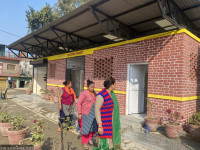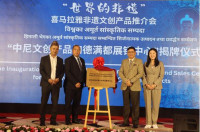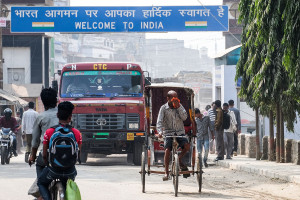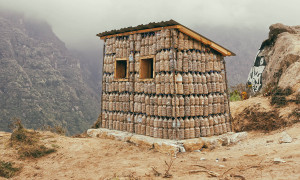Money
Foreign investment inflow poor despite high commitments
Despite billions of rupees worth of commitments, the actual foreign direct investment (FDI) inflow has remained poor.
Bibek Subedi
Despite billions of rupees worth of commitments, the actual foreign direct investment (FDI) inflow has remained poor.
Nepal received FDI pledges worth Rs15.13 billion in 2015-16, but the actual investment amounted to just Rs4.79 billion as of the 11th month of the fiscal year. In 2014-15 too, total FDI inflow stood at Rs4.38 billion, against an all-time high commitment of Rs67.42 billion, according to the statistics of Department of Industry (DoI) and Nepal Rastra Bank (NRB).
Economists and Industrialists said a huge FDI commitment does not hold much significance if only a fraction of it is converted into real investment. “The government and the DoI are happy glorifying investment pledges. However, the actual investment insignificant,” said economist Posh Raj Pandey. “Politicians and business leaders during their abroad trips preach about good business environment and how they value FDI in Nepal. Investors believe them and make investment pledges. But by the time they have to make actual investment they are well aware of ground realities.”
Industrialists say multiple problems as a result of political instability, acute power shortages, and lack of an industry-friendly labour law discourage foreigners to make investments in Nepal. “The low conversion rate of FDI pledges in to investment is due to deteriorating business environment in the country,” said Hari Bhakta Sharma, president of the Confederation of Nepalese Industries (CNI). “Even domestic industrialists are finding it difficult to make investments. In such a situation, it is futile to expect foreign investment.”
Frequent changes in leadership of key ministries dealing with industry, trade and commerce have also made the situation complex. In the last five years, these three ministries never had stable leadership, with ministers changing with successive government changes.
“Key ministries such as industry and commerce should have stable leadership, including ministers and secretaries. Sadly, this is not the case in Nepal,” said a leading industrialist. “This has led to policy inconsistency. The KTM-Tarai Fast Track episode is one such example.”
The Sushil Koirala-led government had decided to develop the KTM-Tarai Fast Track project with involvement of an Indian company. However, the KP Oli-led government revoked the decision saying the government itself will develop the project. “Such instances reduce the confidence of foreign investors,” the industrialist said.
Meanwhile, the World Bank Doing Business Report 2016 highlights the difficulties the Nepali private sector as well as foreign investors face while doing business in Nepal. The report says starting a business in Nepal requires seven procedures, takes 17 days and costs 28.40 percent of the income per capita.
Nepal ranks 105th in global rankings in terms of the ease of starting a business, down from 94th in 2015.
The World Bank report has ranked Nepal 131th in terms of the ease of getting electricity. In South Asia, Nepal ranks behind Bhutan, India and Sri Lanka in connecting a warehouse to electricity.
In terms of enforcing contracts, the report has placed Nepal at 152nd position among 189 countries. A contract enforcement takes 910 days and costs 26.80 percent of the value of the claim in the country.
2013-14 Rs 20.10 billion Rs 3.19 billion
2014-15 Rs 67.42 billion Rs 4.38 billion
2015-16 Rs 15.13 billion Rs 4.79 billion (first 11 months)
Source: Nepal Rastra Bank and Department of Industry




 11.12°C Kathmandu
11.12°C Kathmandu














